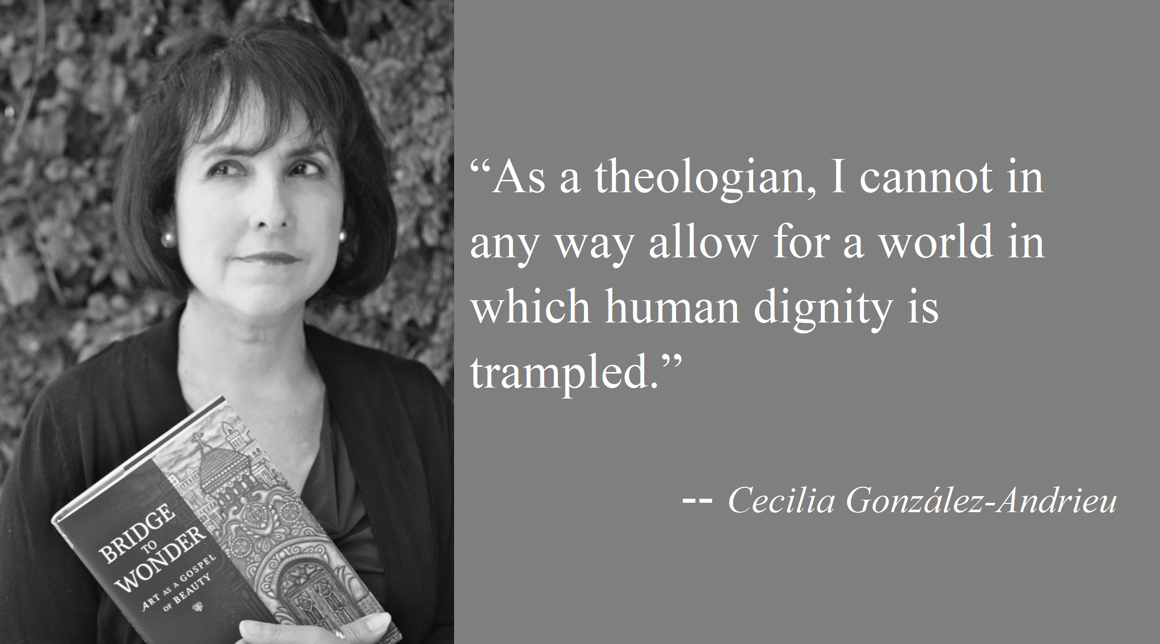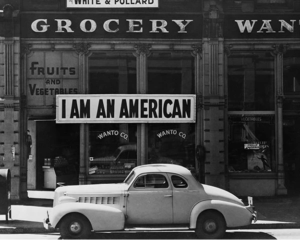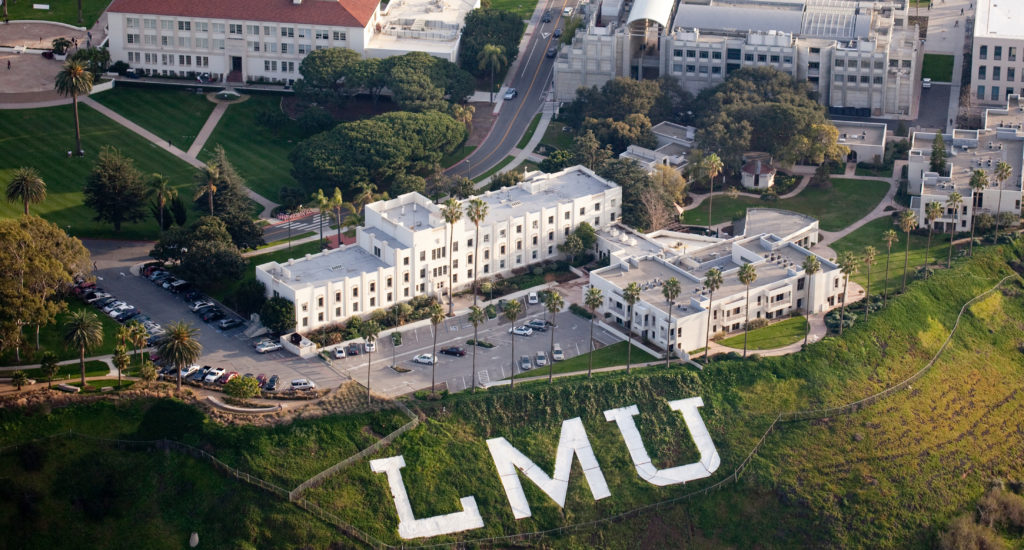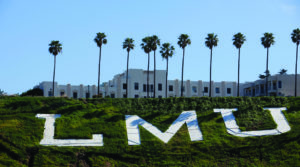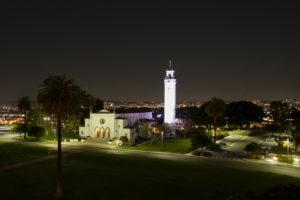By Margarita R. Ochoa, Associate Professor of History
and Francesca Gold ’22, Yoga Studies Master’s Degree Candidate
This year, the Committee on the Status of Women collaborated with the Office of Intercultural Affairs to create a series of Women’s History Month columns for LMU This Week. Our work as a committee is focused on addressing issues that are of special concern to the diverse women and female-identifying students, staff, and faculty in the LMU community.
In keeping with our committee’s mission, columns by members of the committee brought attention to Renée Harrangue, Ph.D., a woman central to the 1973 merger of Marymount College and Loyola University; the COVID-19 pandemic’s disproportionate impact on women and female-identifying caregivers; the innovative work of the scholars who comprise LMU’s Women’s and Gender Studies Department; and the history of sexism in science.[1] In this final installment of the series, we are spotlighting activism and, in particular, the mission of Cecilia González-Andrieu, Ph.D., professor of theological studies and self-described “Latina Theologian.”
González-Andrieu teaches in the undergraduate and graduate programs of the Department of Theological Studies, is a contributing writer for America magazine, has edited and contributed to several books, and authored a monograph, “Bridge to Wonder: Art as a Gospel of Beauty” (Baylor, 2012). She also sits on the board of directors of the Ignatian Solidarity Network, whose mission it is to “network, educate, and form advocates for social justice.” In addition to her exemplary work as a theologian, teacher, and scholar, González-Andrieu has, from her first semester at LMU, focused her ministry on serving a community of students historically marginalized in society and, because of their immigration status, “invisibilized” on university campuses. It is precisely about this important work that we visited with González-Andrieu and asked her to share more about the student population that she serves with the broader LMU community.
How long have you been at LMU and what is your role?
Fourteen years. Well, I came back to LMU in 2007. I’m a double alumna of LMU: Bachelor and Master’s. LMU is my beloved home. A place I love and want to see flourish. I am a professor of theology and, on my ministry side, I am committed to working with undocumented students on campus.
Regarding the Social Justice Scholars: Who is this student population that you serve and what kinds of challenges have these students faced on campus?
The Social Justice Scholars are outstanding students who have been accepted to LMU because they show amazing promise; they have a record of community service, amazing leadership potential, and have also overcome really daunting odds to be here — chief among these is that they are students that are generally termed “undocumented.” What this label really means is that these students have been forced into an immigration status by circumstances that are arbitrary. It reflects the ills of our world and how we fail to care for our most vulnerable.
The kinds of challenges these students have had to face on campus are multiple, from milder ones such as knowing they cannot sign up for study abroad to really painful ones such as being present when others speak ill of immigrants or dehumanize them in class. They’ve also experienced more frightening challenges such as when our art installation for Immigration Awareness Week was vandalized during the 2016 Trump presidential campaign[2] and when students on campus were targeted by white supremacist groups. College is hard enough, and economic challenges for any of our students is hard enough. But having to spend all of your time worrying about whether or not you are going to be deported, or if your family is going to be deported, or if you’re going to have a job after finishing school are all worries that nobody should have to face.
Can you tell us more about the vandalism of the 2016 art installation on the LMU campus?
The art installation was spray-painted with “TRUMP” and “Illegals go home.” It was really frightening for our student community, but we decided to face it. As a theologian, I wanted students to do something that was constructive. So, we put together a ritual to deal with the incident. We invited our allies — including faculty and staff — and met at the installation site. We disassembled the installation and carried it in funeral procession around campus then laid the installation pieces to rest before the chapel, in God’s presence. We then held hands and prayed. It turned out that something that was super traumatic brought out a lot of people to support our students. So, defacing the art installation, in the end, backfired on the racists who committed the vandalism.
What inspired you to work with this student population? And, what is your connection to this population?
Since high school, I have been involved in ministry to the Latinx community. My first degree from LMU was from the film school. So, I was a documentary filmmaker and a news producer and I specialized in telling the stories of the Latinx community, which then led me, when I decided to go on to Ph.D. study, to continue to have that focus as a Latina theologian.
When I came back to campus as a professor, I began teaching a course called “Meeting Christ in Faith and Art.” During my first semester, a student shared with me that he had been offered a wonderful position with ASLMU, but was told that the job could not be given to him because he was undocumented. That conversation with him made me think about what was happening with undocumented students on campus. Through word of mouth, I found out that the person to speak with was Herbert Medina, then professor of mathematics and today the provost of the University of Portland. He had been working on this question for quite a while and had been able to secure a few scholarships for undocumented students. He had been doing amazing work, but on his own. We joined forces and got more people involved: the late Marshall Sauceda in Student Affairs, colleagues in Campus Ministry and in Admission, and a couple of student representatives, and together we crafted a proposal. We took our proposal to the then Provost David W. Burcham who listened to us with great heart and great care and promised to find the resources to fund our proposal.
As a result of this work, we were able to build the Social Justice Scholarship at LMU, which has now graduated multiple classes of students. Our students, who are at the center of my heart, are today lawyers, teachers, doctors, engineers, or are completing graduate and professional studies. They are all young people who, when asked “Why attend LMU?” will always say “for my community.” For many of these students, they are very often the only possibility for their families to survive. They absolutely exemplify our goal of people who are with and for others.
The majority of our students are Hispanic, reflecting California’s demographics. But we have also had a number of students from other parts of the U.S., as well as students of Asian and African descent. So undocumented doesn’t necessarily mean that one is Latinx. It just means that your family has been caught in these terrible geopolitical games that get played while human lives are lost in the process. As a theologian, I cannot in any way allow for a world in which human dignity is trampled. Immigration and the right of human beings to migrate for life and for safety is embedded into the Church’s social teachings. It is embedded in the Hebrew scriptures. It is a major tenet of most religious traditions. I can’t be silent about it.
What are the most important issues to highlight right now with regard to this student community?
Right now, we are at an inflection point in this country. The political realm and the religious community can either be super courageous and bold about the issue of human dignity attached to the right to migrate, to the unification of families, to people’s right to survival, and to the universal human rights of refugees and asylum seekers or we can once more fall into this endless spinning-wheels-on-ice of human lives being used as political pawns. We need to keep our eyes squarely on the issue of migration.
We know that societies are measured by how they treat their most vulnerable people. In the last four years, we tore up much of what we thought this country was about. We have the possibility right now of standing up and saying “we remember now” why we wanted to carry out this experiment of having a place where people from everywhere could come and start anew. Many of us are now remembering that this is our collective story. For me, it is a question of both our political will and of the will of faith communities to actually live up to what we say we believe. If we fail, we have betrayed what we were supposed to be about.
What is one thing you would like readers to know about this population or take from this interview?
Border laws, citizenship status, privileges, exclusions: These are all things that we human beings invented. They are not natural, and, as a theologian, I can tell you they don’t come from the hands of the Creator. Because we are the ones who made these systems, then we are the ones who can change them. We just need to have the will to do so. If we can also start to view diversity as extraordinarily beautiful, instead of as threatening, then I think we can commit ourselves to that vision of change.
When the Trump Muslim ban[3] was announced, I remember that I got in touch with some of the Social Justice Scholars, who were already getting in touch with one another. We met up at a bus stop and went to LAX to witness, to protest, and to pray against the Muslim ban. This is the kind of solidarity we need. I love the selflessness of my students, who themselves were so vulnerable, but wanted to show up at LAX to protest what they saw as an egregious human rights violation. Working together like this is the world I envision and I want to keep working at it.
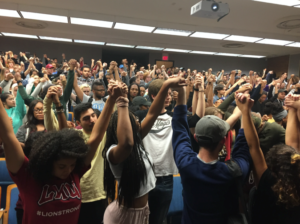
Lastly, is there something you would like us to address that was not captured in our previous questions?
Yes, it is worth mentioning the student organization that is for immigration rights and undocumented students and their allies: RESILIENCE. Our students have become the model for a national network of undocumented students and alumni at Jesuit universities. I am really proud of them because they have taken over the leadership to build more programming for their fellow students and to educate the larger LMU community on immigration. When we are back on campus, we want to continue to build coalitions. For example, right after the 2016 presidential election, our students and the Black Student Union gathered in one of our auditorium classrooms. They were spilling out into the streets. They came together in the spirit of protecting their fellow students.[4] It was extraordinary! I hope that we can now build on the trauma of the last four years.
Lastly, an extra hope of mine is focused on our facilities workers at LMU. They are people who are invisible and often hurting. I have also been working with them and on the issue of workers’ rights on campus.
———-
As of the writing of this article, an average of 600 unaccompanied children are daily apprehended at the U.S.-Mexico border by U.S. border officials.[5] These children are often times walking from their home countries in Central America with the desperate hope — their own and that of their families — that America delivers on its dream-like promises of freedom, liberty, and justice for all. Thus, Cecilia González-Andrieu’s work is far from over. But her teaching, scholarship, and ministry has fostered the development of a robust network of student, staff, and faculty allies who support and advocate for the undocumented population at LMU, the Los Angeles area, and across the nation. Though Immigration Awareness Week activities have been canceled since 2020 due to the COVID-19 pandemic, González-Andrieu shared with us that students are eager to return to campus and pick up where they left off. On this, González-Andrieu has also been instrumental in mentoring and encouraging student leadership and organization on campus with the goal of promoting resilience and solidarity among students engaged in immigration and labor rights activism. RESILIENCE and Students for Labor and Economic Justice (SLEJ) are but two great examples. Her continued work and its legacy are very promising, indeed, for the LMU community and beyond.
[1] Amanda Herring and Alejandra Alarcon, “Women’s History at LMU: Spotlight on Dr. Renée Harrangue,” (February 26, 2021), https://lmuthisweek.lmu.edu/2021/02/26/womens-history-at-lmu-spotlight-on-dr-renee-harrangue/; Sheri Atwater and Becca Okida, “Cura Personalis for Whom? The New ‘Shecession’ Highlights Gender Inequities across Campus,” (March 5, 2021), https://lmuthisweek.lmu.edu/2021/03/05/cura-personalis-for-whom-the-new-shecession-highlights-gender-inequities-across-campus/; Julia Wade and Clementine Castro, “History in the Making: Leaders, Scholars, and Change Agents in Women’s and Gender Studies at LMU,” (March 12, 2021), https://lmuthisweek.lmu.edu/2021/03/12/history-in-the-making-leaders-scholars-and-change-agents-in-womens-and-gender-studies-at-lmu/; and Reed Jones, “Sexism in Science: Was Rosalind Franklin Robbed of a Nobel Prize?” edited by Kennedy Wheatley and Velitchka Kaltcheva (March 22, 2021), https://lmuthisweek.lmu.edu/2021/03/22/sexism-in-science-was-rosalind-franklin-robbed-of-a-nobel-prize/#.
[2] “No Human Being is Illegal Week Wall Defaced,” The Los Angeles Loyolan (April 5, 2016), http://www.laloyolan.com/news/no-human-being-is-illegal-week-wall-defaced/article_68df98de-fb6c-11e5-9d34-0f3b56d10da5.html; and Joy Resmovits, “Loyola Marymount University Wall with Pro-Immigrant Slogans is Defaced,” Los Angeles Times (April 6, 2016), https://www.latimes.com/local/education/higher-ed/la-me-ln-lmu-graffiti-20160406-story.html.
[3] Michael D. Shear and Helene Cooper, “Trump Bars Refugees and Citizens of 7 Muslim Countries,” The New York Times (January 27, 2017), https://www.nytimes.com/2017/01/27/us/politics/trump-syrian-refugees.html.
[4] Cecilia González-Andrieu, “How these students of color found the “fire of love” in the face of a Trump presidency,” America: The Jesuit Review (November 14, 2016), https://www.americamagazine.org/content/dispatches/how-students-color-found-fire-love-face-trump-presidency.
[5] Geneva Sands and Paul LeBlanc, “Nearly Twice as Many Unaccompanied Migrant Children Apprehended Daily at US-Mexico Border as at 2019 Peak,” CNN (March 23, 2021), https://www.cnn.com/2021/03/23/politics/migrant-children-us-mexico-border/index.html.
OIA Buzz
- Cultural Consciousness Conversations is recruiting for its third annual cohort, FY 2021-22. The yearlong program is a project of Intercultural Affairs in collaboration with Ethnic and Intercultural Services. This cohort of faculty, staff, and administrators from various divisions around campus get together once a month to share stories, learn from one another, examine societal norms and cultural differences, and deepen connections across all sectors of the LMU community. Complete the interest form to learn more and sign up.
- We celebrate Bob and Helen Singleton, who were recently conferred the LMU President’s Award, which is the highest non-degree honor given by Loyola Marymount University. It recognizes those who have made a profound and enduring contribution to the greater good of society. View the proclamation here.
- Attend the last Systemic Analysis Report Out session of the semester, today on March 30, 2021, from 4-5 p.m. University Advancement and the College of Communication and Fine Arts and will present on unit systemic analysis and DEI work.
With the LMU Anti-Racism Project’s In Six Words series, we hope to spark conversation, understanding, and empathy across all identities. March stories will highlight the joys, struggles and ways of overcoming obstacles for all people who identify with the gender of women, inclusive of gender fluidity.
This week’s example story is by our own Dr. Jennifer Abe, vice president for Intercultural Affairs:
“Asian AMERICAN solidarity. No Going Back.”
Jennifer says: Famed photographer Dorothea Lange took this image of an Oakland storefront owned by Japanese Americans, who posted the sign in December 1941, after the bombing of Pearl Harbor. Asian Americans have been long viewed as “perpetual foreigners” in this country so that experiences of racism, both personal and societal, have been largely invisible to other Americans. Many of us have heard the phrase, “Go back where you came from,” as if we didn’t belong here. Well, we belong.
`
